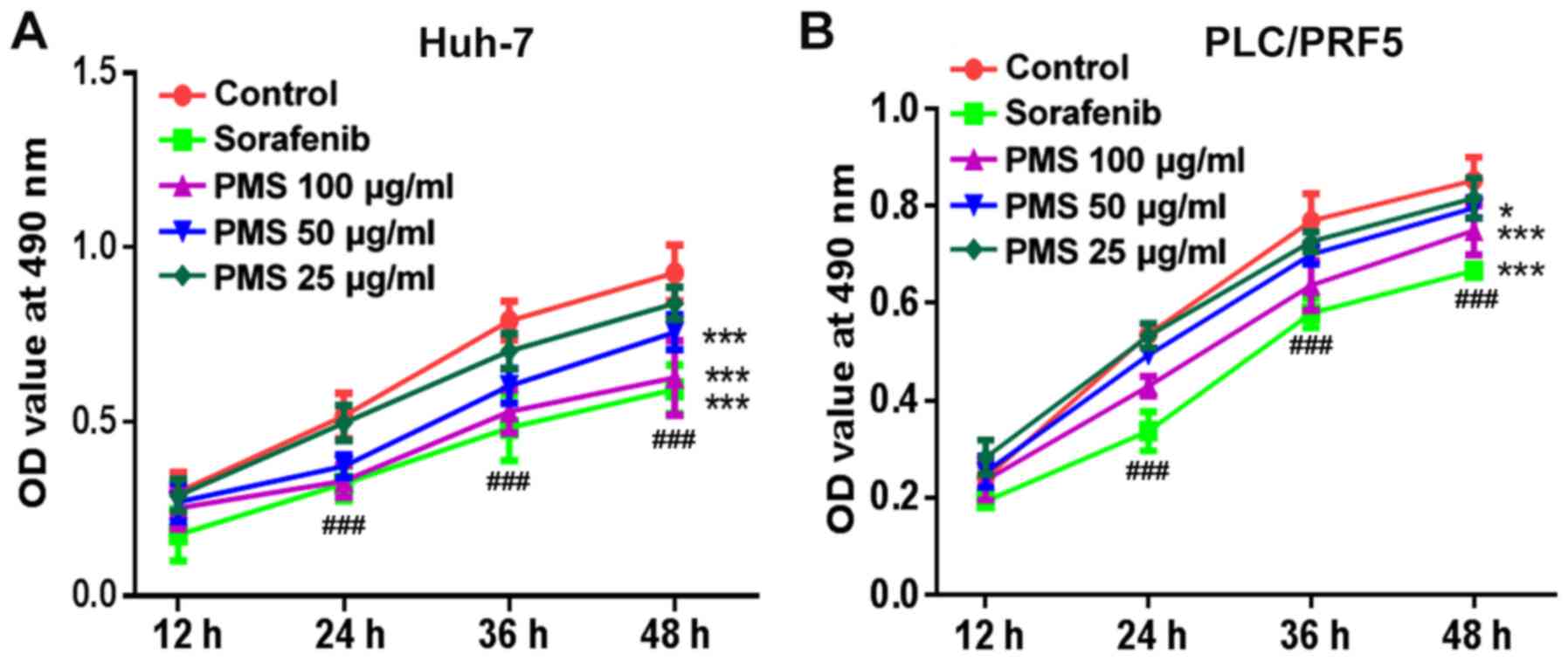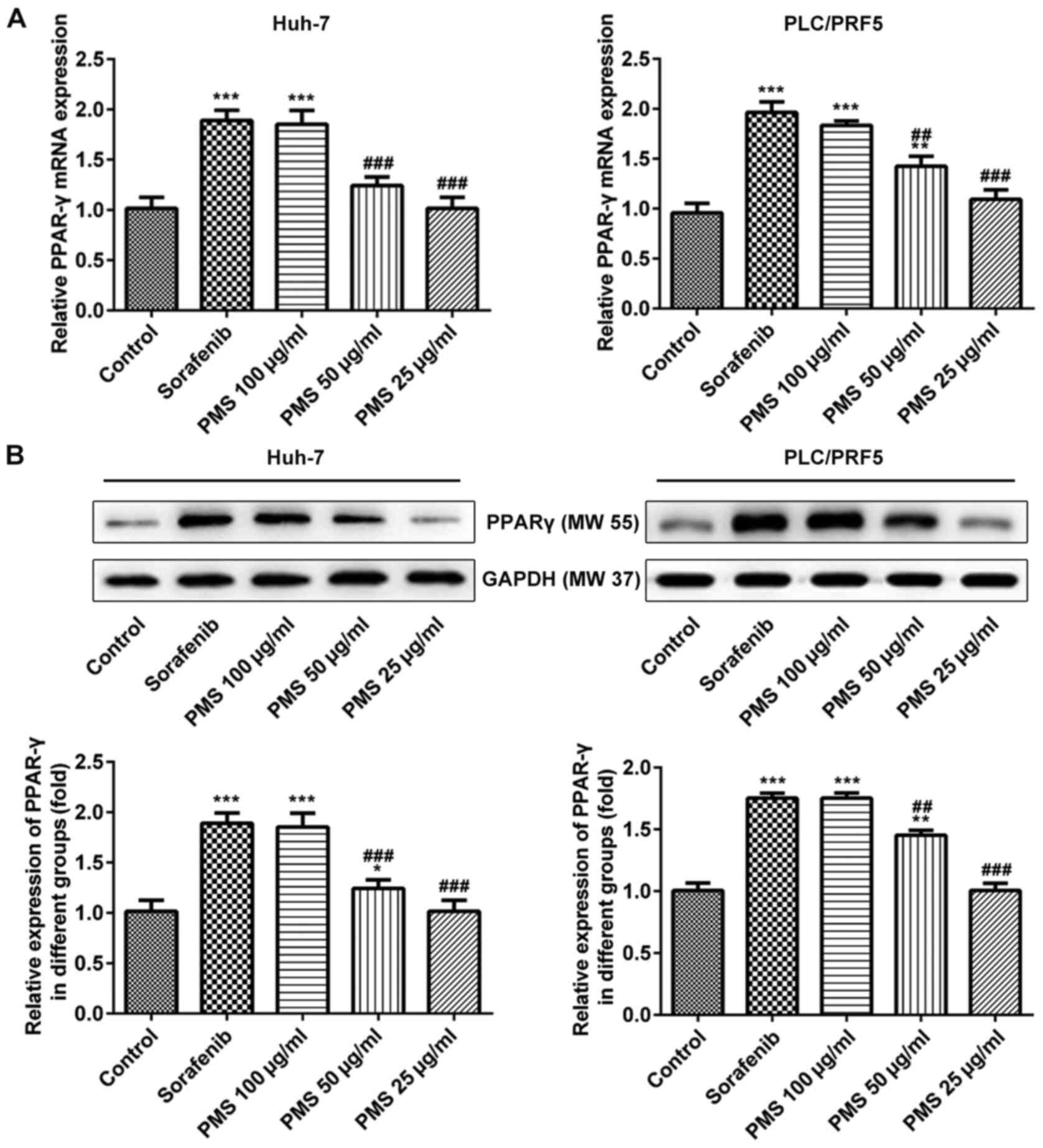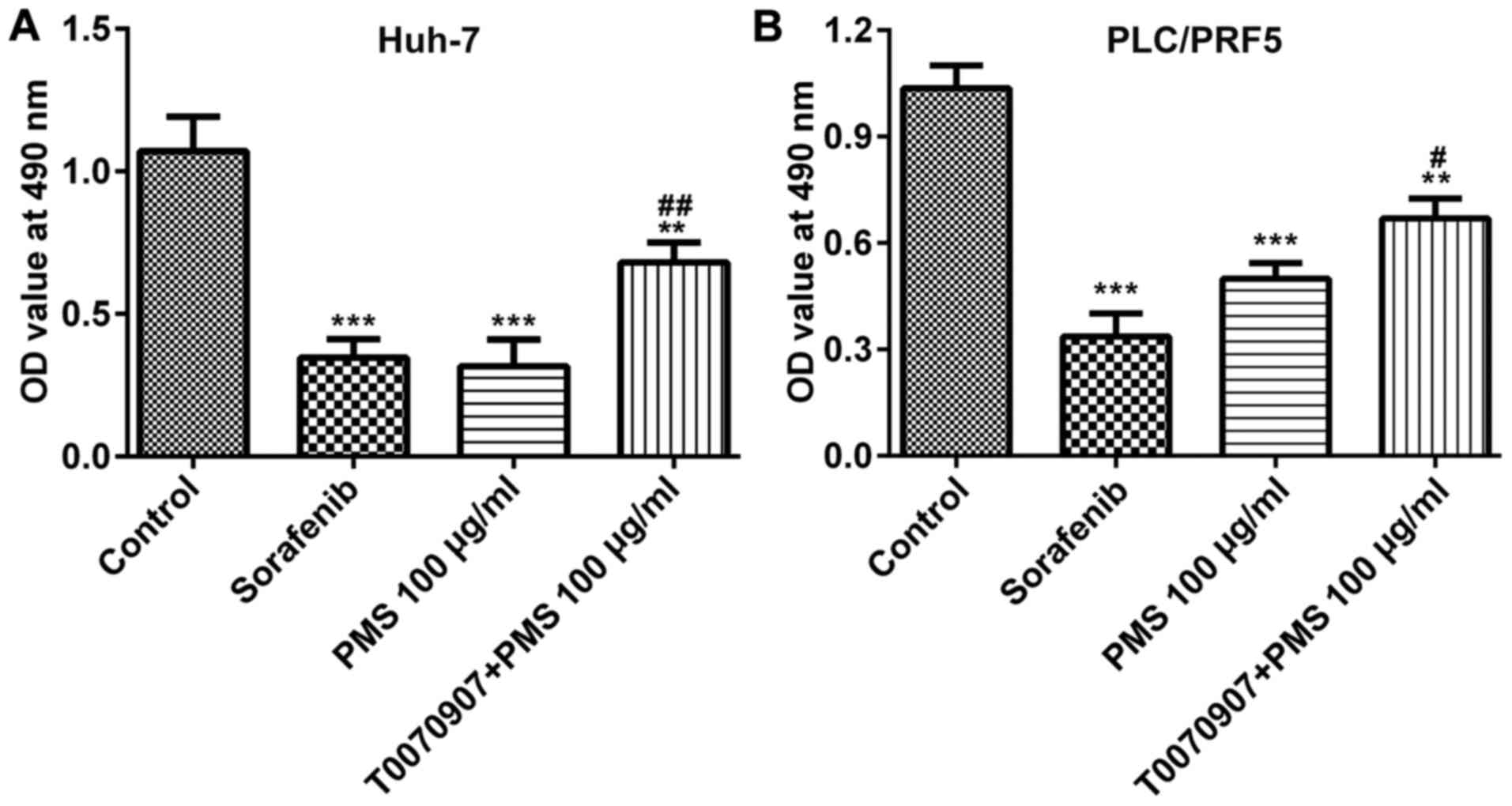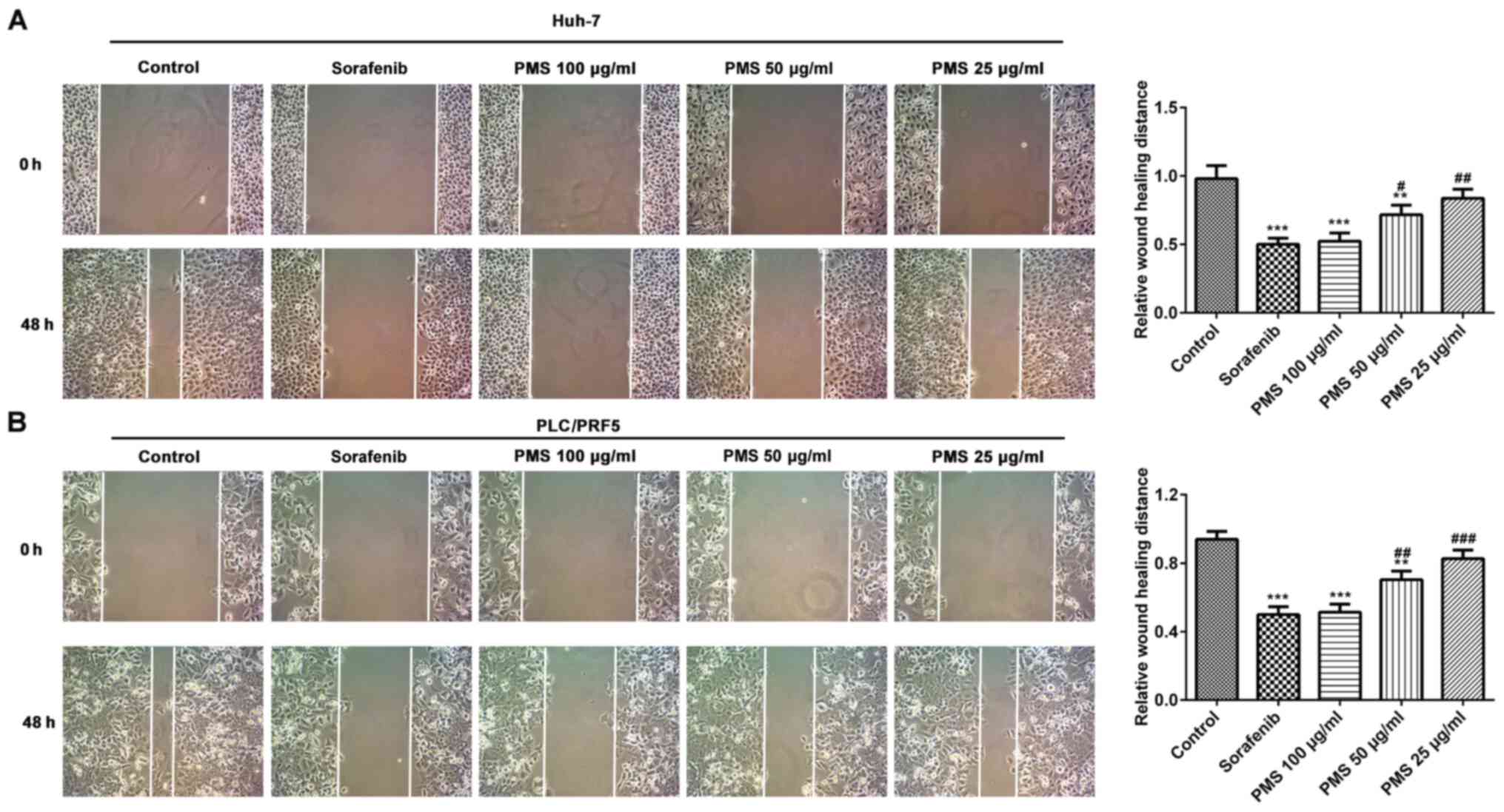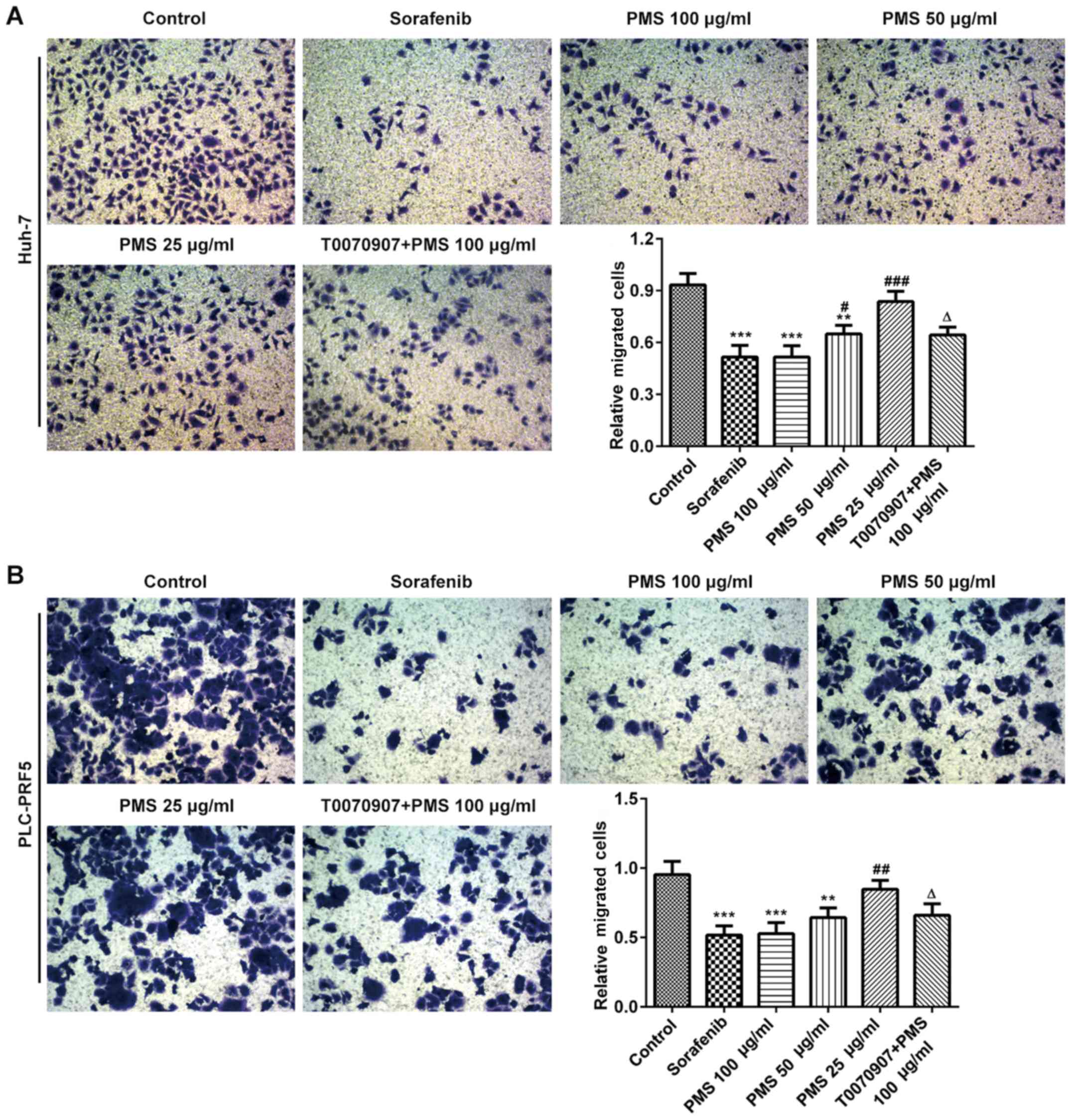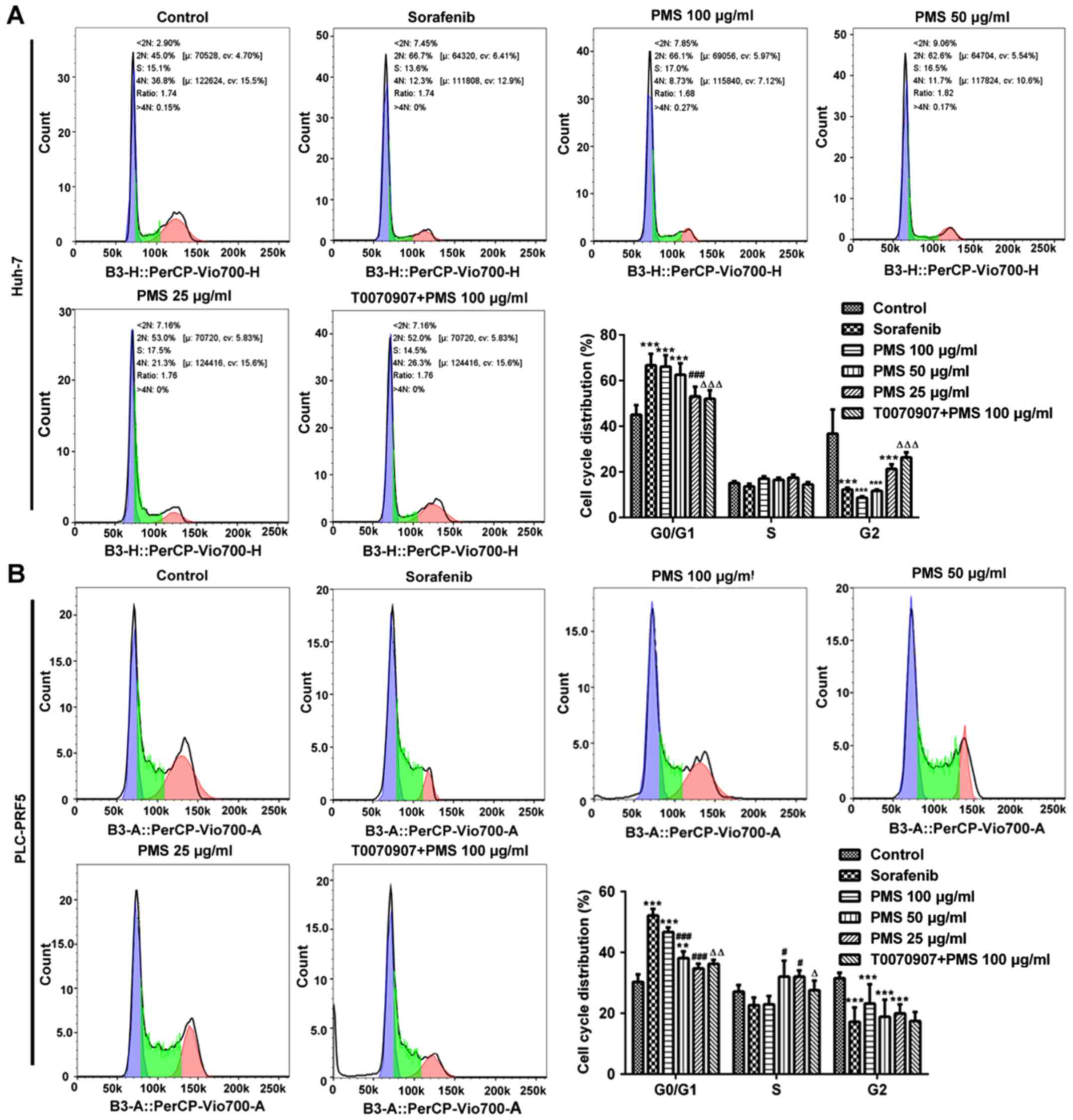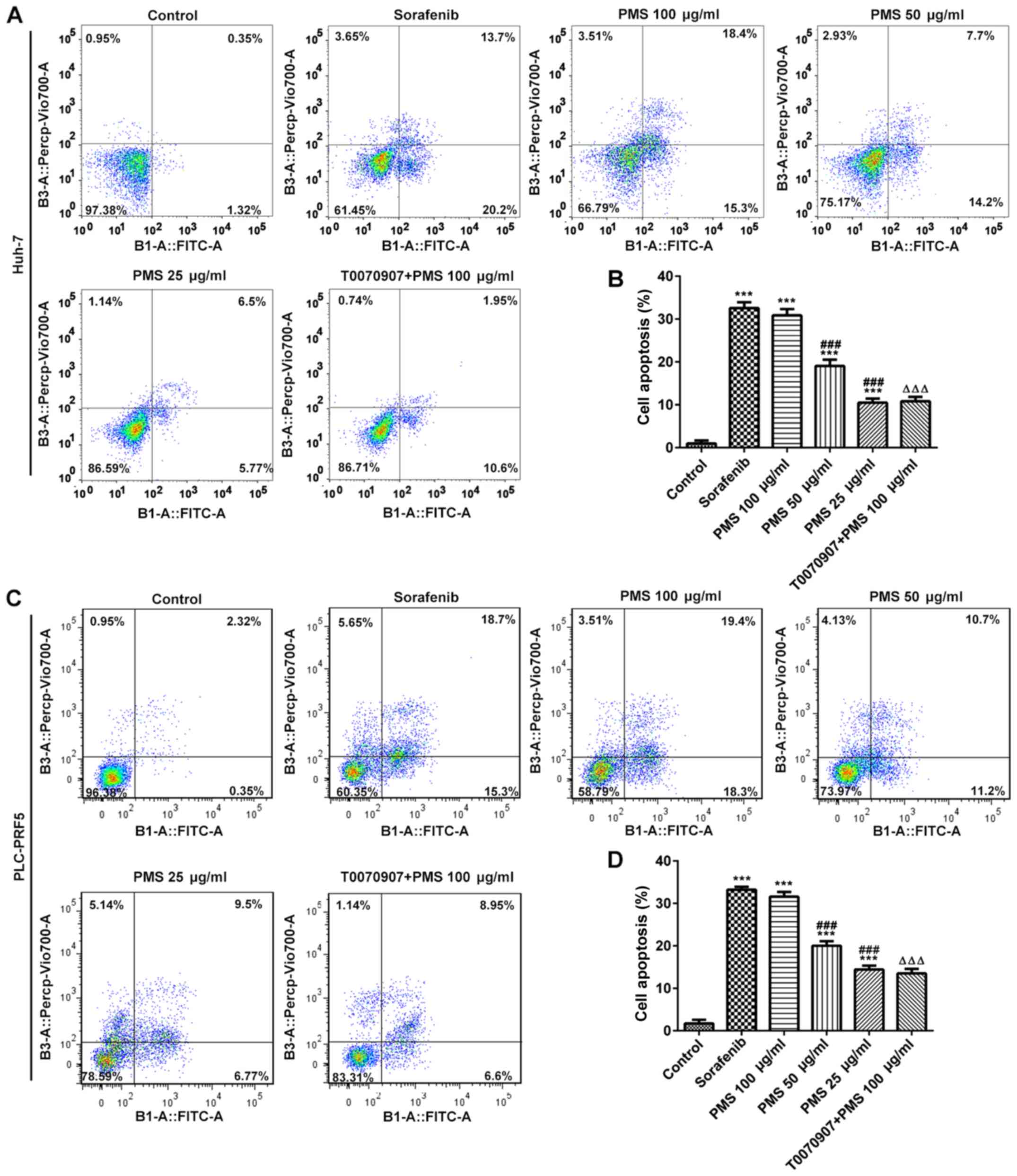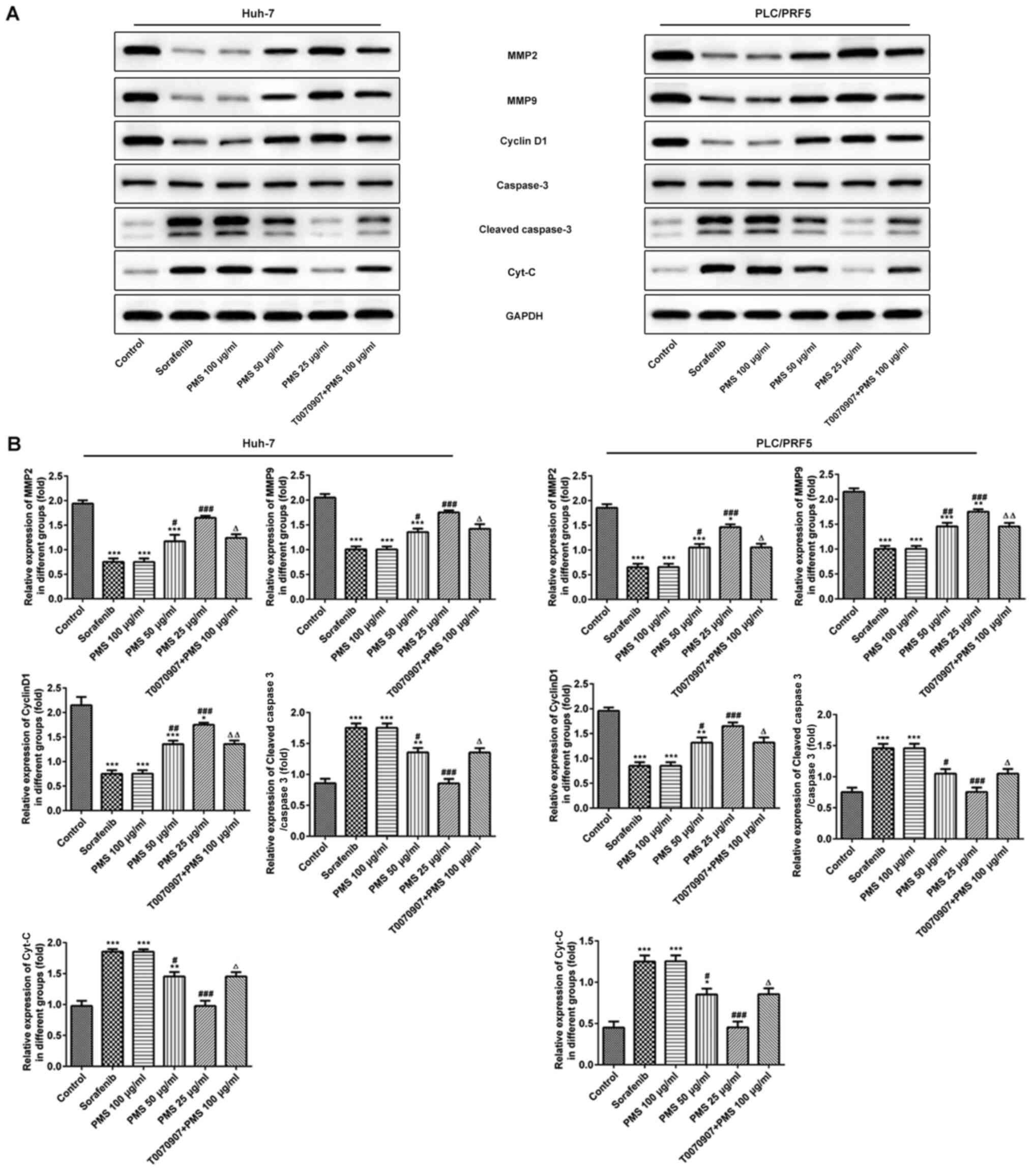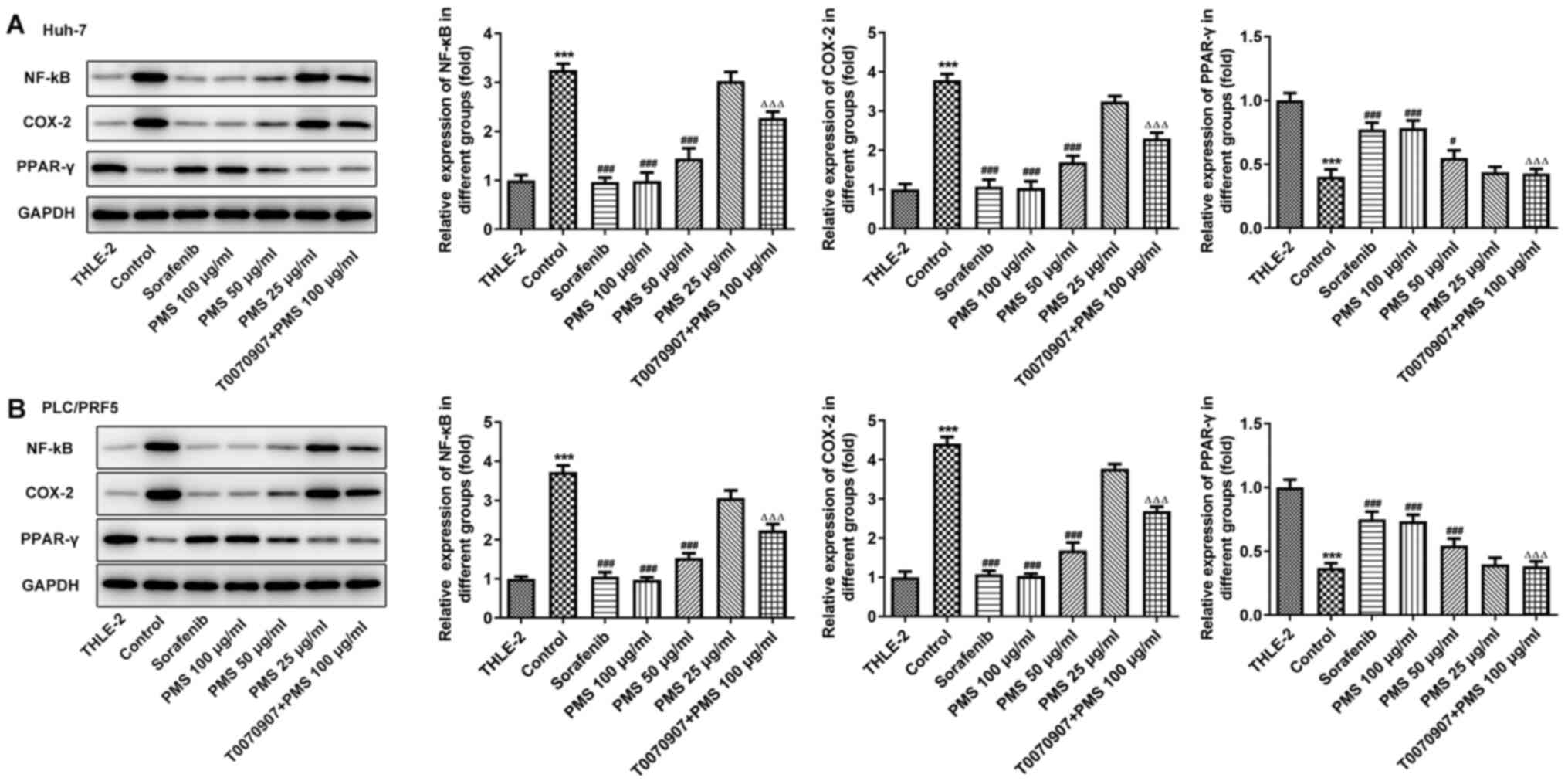|
1
|
Torre LA, Bray F, Siegel RL, Ferlay J,
Lortet-Tieulent J and Jemal A: Global cancer statistics, 2012. CA
Cancer J Clin. 65:87–108. 2015.PubMed/NCBI View Article : Google Scholar
|
|
2
|
Jiang BG, Wang N, Huang J, Yang Y, Sun LL,
Pan ZY and Zhou WP: Tumor SOCS3 methylation status predicts the
treatment response to TACE and prognosis in HCC patients.
Oncotarget. 8:28621–28627. 2017.PubMed/NCBI View Article : Google Scholar
|
|
3
|
Guo XL, Li D, Hu F, Song JR, Zhang SS,
Deng WJ, Sun K, Zhao QD, Xie XQ, Song YJ, et al: Targeting
autophagy potentiates chemotherapy-induced apoptosis and
proliferation inhibition in hepatocarcinoma cells. Cancer Lett.
320:171–179. 2012.PubMed/NCBI View Article : Google Scholar
|
|
4
|
Tontonoz P and Spiegelman BM: Fat and
beyond: The diverse biology of PPARgamma. Ann Rev Biochemistry.
77:289–312. 2008.PubMed/NCBI View Article : Google Scholar
|
|
5
|
Heudobler D, Rechenmacher M, Lüke F,
Vogelhuber M, Pukrop T, Herr W, Ghibelli L, Gerner C and Reichle A:
Peroxisome proliferator-activated receptors (PPAR)γ agonists as
master modulators of tumor tissue. Int J Mol Sci.
19(3540)2018.PubMed/NCBI View Article : Google Scholar
|
|
6
|
Shen B, Chu ES, Zhao G, Man K, Wu CW,
Cheng JT, Li G, Nie Y, Lo CM, Teoh N, et al: PPARgamma inhibits
hepatocellular carcinoma metastases in vitro and in mice. Br J
Cancer. 106:1486–1494. 2012.PubMed/NCBI View Article : Google Scholar
|
|
7
|
Yu J, Shen B, Chu ES, Teoh N, Cheung KF,
Wu CW, Wang S, Lam CN, Feng H, Zhao J, et al: Inhibitory role of
peroxisome proliferator-activated receptor gamma in
hepatocarcinogenesis in mice and in vitro. Hepatology.
51:2008–2019. 2010.PubMed/NCBI View Article : Google Scholar
|
|
8
|
Nojima H, Kuboki S, Shinoda K, Shimizu H,
Ohtsuka M, Kato A, Yoshitomi H, Furukawa K, Takayashiki T and
Miyazaki M: Activation of peroxisome proliferator-activated
receptor-gamma inhibits tumor growth by negatively regulating
nuclear factor-κB activation in patients with hepatocellular
carcinoma. J Hepatobiliary Pancreat Sci. 23:574–584.
2016.PubMed/NCBI View
Article : Google Scholar
|
|
9
|
Zhang N, Chu ES, Zhang J, Li X, Liang Q,
Chen J, Chen M, Teoh N, Farrell G, Sung JJ and Yu J: Peroxisome
proliferator activated receptor alpha inhibits hepatocarcinogenesis
through mediating NF-kappaB signaling pathway. Oncotarget.
5:8330–8340. 2014.PubMed/NCBI View Article : Google Scholar
|
|
10
|
Kern MA, Schoneweiss MM, Sahi D, Bahlo M,
Haugg AM, Kasper HU, Dienes HP, Käferstein H, Breuhahn K and
Schirmacher P: Cyclooxygenase-2 inhibitors suppress the growth of
human hepatocellular carcinoma implants in nude mice.
Carcinogenesis. 25:1193–1199. 2004.PubMed/NCBI View Article : Google Scholar
|
|
11
|
Tsatsanis C, Androulidaki A, Venihaki M
and Margioris AN: Signalling networks regulating cyclooxygenase-2.
Int J Biochem Cell Biol. 38:1654–1661. 2006.PubMed/NCBI View Article : Google Scholar
|
|
12
|
Wu H, Zhao G, Jiang K, Chen X, Zhu Z, Qiu
C, Li C and Deng G: Plantamajoside ameliorates
lipopolysaccharide-induced acute lung injury via suppressing NF-κB
and MAPK activation. Int Immunopharmacol. 35:315–322.
2016.PubMed/NCBI View Article : Google Scholar
|
|
13
|
Pei S, Yang X, Wang H, Zhang H, Zhou B,
Zhang D and Lin D: Plantamajoside, a potential anti-tumor herbal
medicine inhibits breast cancer growth and pulmonary metastasis by
decreasing the activity of matrix metalloproteinase-9 and -2. BMC
Cancer. 15(965)2015.PubMed/NCBI View Article : Google Scholar
|
|
14
|
Li X, Chen D, Li M, Gao X, Shi G and Zhao
H: Plantamajoside inhibits lipopolysaccharide-induced
epithelial-mesenchymal transition through suppressing the
NF-κB/IL-6 signaling in esophageal squamous cell carcinoma cells.
Biomed Pharmacother. 102:1045–1051. 2018.PubMed/NCBI View Article : Google Scholar
|
|
15
|
Han AR, Nam MH and Lee KW: Plantamajoside
inhibits UVB and advanced glycation end products-induced MMP-1
expression by suppressing the MAPK and NF-κB pathways in HaCaT
cells. Photochem Photobiol. 92:708–719. 2016.PubMed/NCBI View Article : Google Scholar
|
|
16
|
Ma C and Ma W: Plantamajoside inhibits
lipopolysaccharide-induced MUC5AC expression and inflammation
through suppressing the PI3K/Akt and NF-κB signaling pathways in
human airway epithelial cells. Inflammation. 41:795–802.
2018.PubMed/NCBI View Article : Google Scholar
|
|
17
|
Son WR, Nam MH, Hong CO, Kim Y and Lee KW:
Plantamajoside from Plantago asiatica modulates human umbilical
vein endothelial cell dysfunction by glyceraldehyde-induced AGEs
via MAPK/NF-κB. BMC Complement Altern Med. 17(66)2017.PubMed/NCBI View Article : Google Scholar
|
|
18
|
Lee G, Elwood F, McNally J, Weiszmann J,
Lindstrom M, Amaral K, Nakamura M, Miao S, Cao P, Learned RM, et
al: T0070907, a selective ligand for peroxisome
proliferator-activated receptor gamma, functions as an antagonist
of biochemical and cellular activities. J Biol Chem.
277:19649–19657. 2002.PubMed/NCBI View Article : Google Scholar
|
|
19
|
Livak KJ and Schmittgen TD: Analysis of
relative gene expression data using real-time quantitative PCR and
the 2(-Delta Delta C(T)) method. Methods. 25:402–408.
2001.PubMed/NCBI View Article : Google Scholar
|
|
20
|
Yao P, Li Y, Shen W, Xu X, Zhu W, Yang X,
Cao J and Xing C: ANKHD1 silencing suppresses the proliferation,
migration and invasion of CRC cells by inhibiting YAP1-induced
activation of EMT. Am J Cancer Res. 8:2311–2324. 2018.PubMed/NCBI
|
|
21
|
Tchakarska G and Sola B: The double
dealing of cyclin D1. Cell Cycle. 19:163–178. 2020.PubMed/NCBI View Article : Google Scholar
|
|
22
|
Kalpage HA, Bazylianska V, Recanati MA,
Fite A, Liu J, Wan J, Mantena N, Malek MH, Podgorski I, Heath EI,
et al: Tissue-specific regulation of cytochrome c by
post-translational modifications: Respiration, the mitochondrial
membrane potential, ROS, and apoptosis. FASEB J. 33:1540–1553.
2019.PubMed/NCBI View Article : Google Scholar
|
|
23
|
Sarris J, Panossian A, Schweitzer I,
Stough C and Scholey A: Herbal medicine for depression, anxiety and
insomnia: A review of psychopharmacology and clinical evidence. Eur
Neuropsychopharmacol. 21:841–860. 2011.PubMed/NCBI View Article : Google Scholar
|
|
24
|
Feng YX, Wang T, Deng YZ, Yang P, Li JJ,
Guan DX, Yao F, Zhu YQ, Qin Y, Wang H, et al: Sorafenib suppresses
postsurgical recurrence and metastasis of hepatocellular carcinoma
in an orthotopic mouse model. Hepatology. 53:483–492.
2011.PubMed/NCBI View Article : Google Scholar
|
|
25
|
Llovet JM, Ricci S, Mazzaferro V, Hilgard
P, Gane E, Blanc JF, de Oliveira AC, Santoro A, Raoul JL, Forner A,
et al: Sorafenib in advanced hepatocellular carcinoma. N Engl J
Med. 359:378–390. 2008.PubMed/NCBI View Article : Google Scholar
|
|
26
|
Han M, Gao H, Ju P, Gao MQ, Yuan YP, Chen
XH, Liu KL, Han YT and Han ZW: Hispidulin inhibits hepatocellular
carcinoma growth and metastasis through AMPK and ERK signaling
mediated activation of PPARγ. Biomed Pharmacother. 103:272–283.
2018.PubMed/NCBI View Article : Google Scholar
|
|
27
|
Liu YI, Liu Z, Chen Y, Xu K and Dong J:
PPARγ activation reduces ischemia/reperfusion-induced metastasis in
a murine model of hepatocellular carcinoma. Exp Ther Med.
11:387–396. 2016.PubMed/NCBI View Article : Google Scholar
|
|
28
|
Takahashi N, Okumura T, Motomura W,
Fujimoto Y, Kawabata I and Kohgo Y: Activation of PPARγ inhibits
cell growth and induces apoptosis in human gastric cancer cells.
FEBS Lett. 455:135–139. 1999.PubMed/NCBI View Article : Google Scholar
|
|
29
|
Bock FJ and Tait SWG: Mitochondria as
multifaceted regulators of cell death. Nature reviews. Mol Cell
Biol. 21:85–100. 2020.PubMed/NCBI View Article : Google Scholar
|
|
30
|
Bendris N, Lemmers B and Blanchard JM:
Cell cycle, cytoskeleton dynamics and beyond: The many functions of
cyclins and CDK inhibitors. Cell Cycle. 14:1786–1798.
2015.PubMed/NCBI View Article : Google Scholar
|
|
31
|
Niu Z, Shi Q, Zhang W, Shu Y, Yang N, Chen
B, Wang Q, Zhao X, Chen J, Cheng N, et al: Caspase-1 cleaves PPARγ
for potentiating the pro-tumor action of TAMs. Nat Commun.
8(766)2017.PubMed/NCBI View Article : Google Scholar
|
|
32
|
Zhao T, Du H, Blum JS and Yan C: Critical
role of PPARγ in myeloid-derived suppressor cell-stimulated cancer
cell proliferation and metastasis. Oncotarget. 7:1529–1543.
2016.PubMed/NCBI View Article : Google Scholar
|
|
33
|
Cheng J, Miao B, Hu KQ, Fu X and Wang XD:
Apo-10'-lycopenoic acid inhibits cancer cell migration and
angiogenesis and induces peroxisome proliferator-activated receptor
γ. J Nutr Biochem. 56:26–34. 2018.PubMed/NCBI View Article : Google Scholar
|
|
34
|
Ikawa H, Kameda H, Kamitani H, Baek SJ,
Nixon JB, Hsi LC and Eling TE: Effect of PPAR activators on
cytokine-stimulated cyclooxygenase-2 expression in human colorectal
carcinoma cells. Exp Cell Res. 267:73–80. 2001.PubMed/NCBI View Article : Google Scholar
|
|
35
|
Han S, Inoue H, Flowers LC and Sidell N:
Control of COX-2 gene expression through peroxisome
proliferator-activated receptor gamma in human cervical cancer
cells. Clin Cancer Res. 9:4627–4635. 2003.PubMed/NCBI
|
|
36
|
Cildir G, Low KC and Tergaonkar V:
Noncanonical NF-κB signaling in health and disease. Trends Mol Med.
22:414–429. 2016.PubMed/NCBI View Article : Google Scholar
|
|
37
|
Xiong S, Wang Y, Li H and Zhang X: Low
dose of bisphenol a activates NF-κB/IL-6 signals to increase
malignancy of neuroblastoma cells. Cell Mol Neurobiol.
37:1095–1103. 2017.PubMed/NCBI View Article : Google Scholar
|
|
38
|
Bren-Mattison Y, Meyer AM, Van Putten V,
Li H, Kuhn K, Stearman R, Weiser-Evans M, Winn RA, Heasley LE and
Nemenoff RA: Antitumorigenic effects of peroxisome
proliferator-activated receptor-gamma in non-small-cell lung cancer
cells are mediated by suppression of cyclooxygenase-2 via
inhibition of nuclear factor-kappaB. Mol Pharmacol. 73:709–717.
2008.PubMed/NCBI View Article : Google Scholar
|















